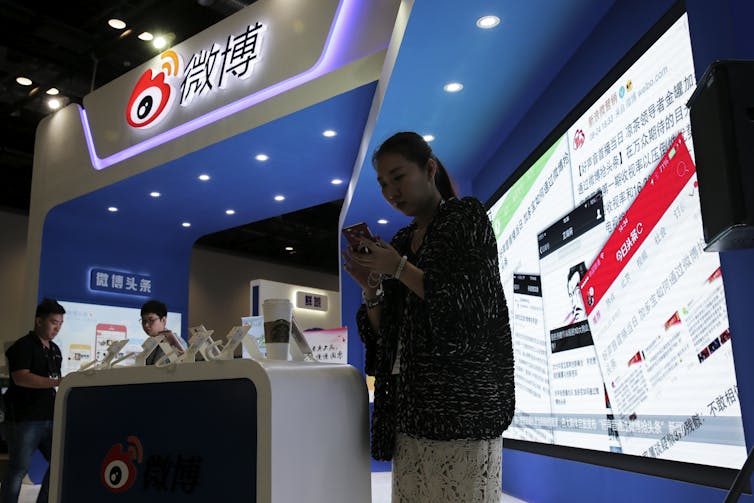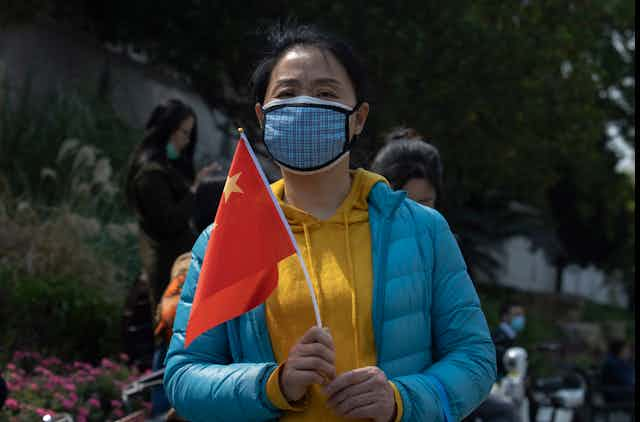Conspiracy theories about COVID-19 have accompanied the pandemic from the beginning. Crucial to managing the pandemic is mitigating the effects of misinformation, which the World Health Organization dubbed an “infodemic.”
Conspiracy theories and misinformation are global phenomena that affect people’s perceptions of other countries, yet little is understood about which COVID-19 conspiracy theories are popular on Chinese social media, how this differs from misinformation on U.S. social media and what lessons this holds for countering global misinformation.
As researchers who study online media and public discourse, my colleagues and I examined conspiracy theories about the origins of COVID-19 and narratives that debunk them on Sina Weibo, the Chinese equivalent of Twitter and one of the major Chinese social media platforms.
We found that popular conspiracies on Weibo about the origins of COVID-19 differ substantially from those in the U.S., with many claiming that a national government deliberately constructed the coronavirus. Conspiracy posts and posts attributing responsibility to the U.S. surged during Sino-U.S. confrontations.
Surveys show that many Americans also believe COVID-19 conspiracy theories, however most of those conspiracy theories involved personalities such as Bill Gates and Anthony Fauci or unfounded alternative explanations for the illness, such as 5G, the new high-speed wireless network technology.

We also found in our analysis of Chinese social media that debunking posts can be more effective when they come from women and influencers, who are people with large followings on social media. Debunking posts are also more effective when they cite scientists as the source. We believe these techniques could be effective not only in China but in other countries as well.
Nationalism and international conflict
We collected and analyzed COVID-19 posts from a pool of 250 million Weibo users from Jan. 1 to April 30, 2020. Although conspiracy theories related to 5G, the bogus documentary “Plandemic” and Bill Gates were prevalent in the U.S., these conspiracy narratives were not popular on Weibo (4.95%). Prevalent conspiracy theories on Weibo centered around whether COVID-19 was deliberately made as a bioweapon by the U.S., China, Japan or another country.
The volume of conspiracy theories and debunking narratives surged during times of Chinese-U.S. conflict from January to April 2020. These include when President Donald Trump first referred to the coronavirus as the “Chinese Virus” on March 16; during several diplomatic conflicts around March 25, on April 21 when Trump announced a green card ban to prevent people from immigrating to the U.S.; and when Secretary of State Mike Pompeo announced the 5G Clean Path on April 29, which required that wireless communications entering and exiting U.S. diplomatic facilities bypass the equipment of “untrustworthy” communications companies like China’s Huawei.
During these Chinese-U.S. confrontations, we also observed a surge in posts that focused on blaming the U.S. as the original source of COVID-19.
The pandemic has exacerbated a global trend toward nationalism. These two forces have given rise to vaccine nationalism, which could threaten the plan for global access to COVID-19 vaccines.
Meanwhile, about 78% of Americans faulted China for its handling of the COVID-19 outbreak, according to a Pew Research Center survey.
COVID-19 is an example of how science can be distorted to divide people within a country and across nations. To understand how to effectively communicate about the pandemic, it’s important to take into account the political contexts in which science and health communication occur.
Lessons for countering the COVID-19 infodemic
Fighting conspiracy theories is a difficult battle. Scholars of communication and psychology point out the psychological mechanisms that cause people to reject factual information if it challenges their worldview or sense of themselves.
My colleagues and I offer three strategies for countering misinformation that can overcome these political and psychological hurdles.
First, create a constructive media environment to inoculate the public.
We suggest that political parties and media should avoid using nationalistic and politically motivated narratives when communicating about the pandemic. They should produce more messages that advocate for common interests and values for fighting the pandemic and the infodemic.
We also recommend that public agencies, scholars and social media companies conduct more experiments to explore effective misinformation inoculation strategies that can help the public recognize and reject politically driven conspiracy theories. To help the public become more sophisticated in processing messages, researchers and communicators could give the public a small dose of conspiracy narratives and explicitly warn about the political motives behind these conspiracy theories.
Second, improve public awareness through deliberation.
We recommend that a long-term solution to fight misinformation is to develop opportunities for conversations between people of different political orientations in order to have constructive dialogues that develop mutual understanding and to form thoughtful opinions. People with deeply divided views can have constructive conversations with each other. Vulnerable populations can be empowered to have thoughtful engagement with each other.
[Deep knowledge, daily. Sign up for The Conversation’s newsletter.]
Third, choose effective message senders and sources to correct misinformation.
We suggest that social media companies and public agencies consider actively seeking help from credible influencers, and women who don’t have large followings, to disseminate debunking information. Information on social media competes for public attention. Our research found that posts that came from influencers, as well as women without enormous numbers of followers, and that cited scientists or other scholars, received more likes, comments, retweets and hashtags.
The right messenger and the right information source are critical for increasing public engagement and understanding of science.
Cuihua Shen and Jingwen Zhang of the University of California, Davis; Anfan Chen of the University of Science and Technology of China; and Jingbo Meng of Michigan State University contributed to this article.

